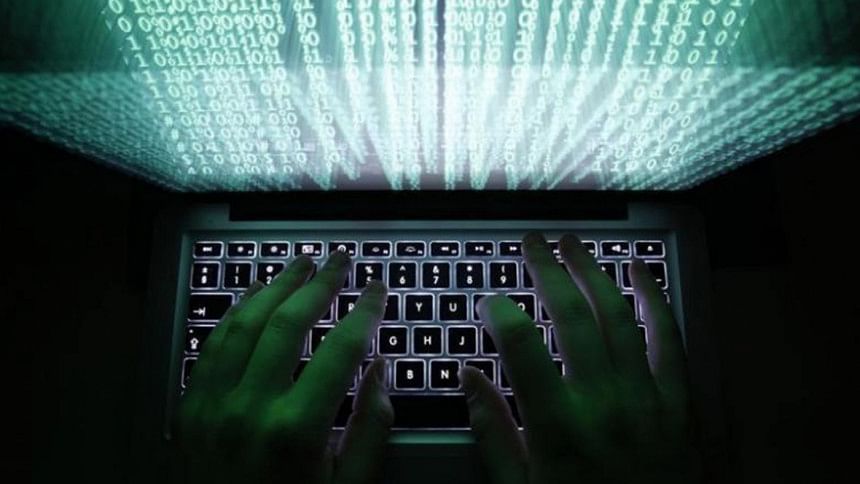Unease over the Digital Security Act

The netizens of the country are at unease over the impending digital security law drafted for ensuring security in the cyberspace. Is there anything to be concerned about?
The draft Bangladeshi digital security law identifies computer fraud, identity theft and impersonation, cyber-terrorism, violation of privacy, and production, distribution and consumption of pornography, and spamming as crimes and recommends punishments for committing these crimes. Computer fraud is defined as unauthorised access to any computer or computer system or network with a view to harming the owner of the computer or the system or making financial gain by modifying, distorting or deleting any data. Spamming someone with an intention to harm him or her financially is also counted as a crime. Identity theft includes stealing one's identity to cheat or impersonate other people to make financial or material gain by using a computer or a computer system or network.
Cyber-terrorism occurs when the activities of the government or a government agency or an official is obstructed by terrorising people to jeopardise national security, sovereignty, solidarity and public order by using a computer or a computer network or by barring someone from accessing a computer, computer system or network. Unauthorised access to a computer, computer system or network, abetting and instigating someone to do so, and abusing someone's computer, computer system or network with a view to impeding public order and state security are also counted as cyber-terrorist acts. Under the draft law, other cyber-terrorism acts include spreading viruses to a computer system, jeopardising the security of a foreign country, damaging the property of a foreign country, and obstructing an international organisation from doing its work by abusing computers, computer systems and networks.
According to the draft law, one's privacy is violated by capturing a private picture of that person without his/her permission and disseminating such pictures. Private pictures refer to nude and half naked images of a person and images showing a person in underwear or briefs or exposing their private parts. The law also criminalises the creation and distribution of pornography and accessing pornographic sites. The law recommends discreet punishments for all the above crimes.
It talks about creating a digital security agency to ensure the security of the computers as well as computer networks and curb cybercrimes (i.e., Section 5). This agency will have the authority to monitor cybercrimes, financial transactions through computer networks, collect reports related to cybercrimes from the network operators, and impart cybersecurity training to the employees of different network service providers. This agency will be an arm of the ICT Ministry and have a central computer emergency response team (CERT) to deal with any debacles in the cyberspace.
This law also has provisions for creating a national cyber security council with the prime minister as its head to discuss digital security issues and take necessary measures in this regard. This may also work as the policy-making body for digital security issues.
This is not to deny that we need a law to check cybercrimes and cyber-terrorism but we also need to protect free speech, human rights and privacy. The creation of a digital security agency is a unique step. But the monitoring power given to this agency and the emergency power given to its director general may violate people's privacy and help create a surveillance society and can help create a cyber czar in the country. It is also not clear why it is necessary to create such an agency when there is a CERT and cyber tribunal.
What makes the offences such as attack on national security, public peace, religious susceptibility, nudity, immorality and sovereignty are subject to interpretations. Provisions related to these crimes may allow repressive regimes to harass innocent people and persecute dissenting voices.
The Bangladeshi draft law gives an investigator authority to search any place, seize any computer or data, and arrest anyone without warrant if they have the reason to believe that a cybercrime is happening. Sometimes it may be necessary for the law enforcement agency to conduct a search and seizure and arrest someone without warrant but there is also a risk of misusing this provision. Since cybercrimes are specialised crimes a police officer may not always be able to handle. To address this, the law should have provisions to include technical experts in investigation teams.
The draft law makes cybercrimes non-bailable. Bail, defined as some form of property deposited or pledged to the court to release an accused or a prisoner from the custody with a condition that he/she will show up in the court whenever required, has been treated as a fundamental right of the accused in Bangladeshi legal tradition. Bail is admitted to save an innocent from imprisonment. The court is believed to consider an accused innocent until he/she is proven guilty. However, there are some non-bailable offences according to the Bangladesh Code of Criminal Procedure (CrPC). For example, no bail is granted when the accused may be guilty of an offence punishable either by death or imprisonment for life. However, exception to this is also made if the accused is below sixteen years of age, a woman, or a sick person. Making cybercrimes non-bailable, the law takes the harshest route to resist the crimes and allows critics to say that a fundamental right has been taken away from the accused. In line with our legal tradition and practices related to cybercrimes in other countries it would be wise not to make the offences non-bailable and leave the issue of bail to the discretion of the judges.
Finally, it is also harsh to treat the production and dissemination of pornography and accessing pornographic sites as crimes of the same magnitude. Accessing pornography is an issue of morality not a crime.
The writer is Professor and Founder Chair of the Department of Television and Film Studies at the University of Dhaka

 For all latest news, follow The Daily Star's Google News channel.
For all latest news, follow The Daily Star's Google News channel. 



Comments